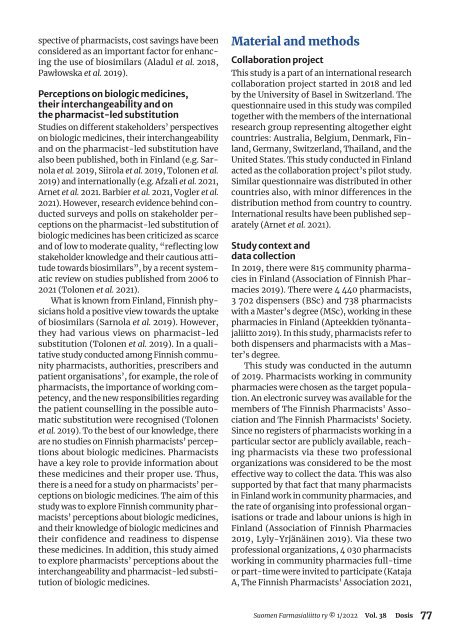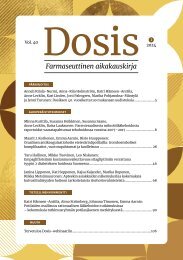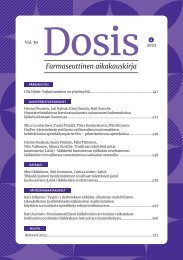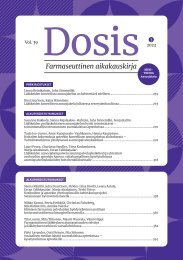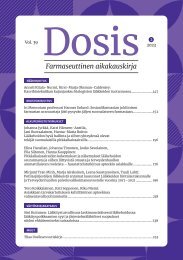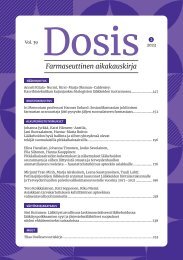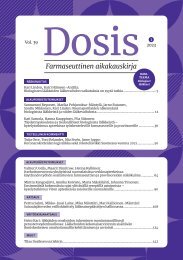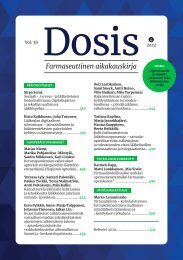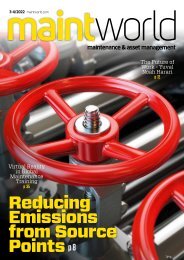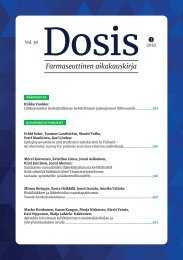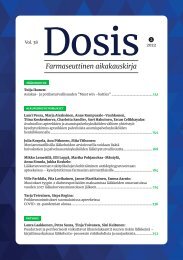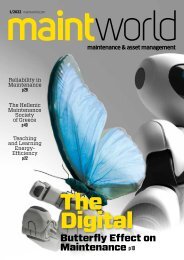DOSIS 1/2022
Farmaseuttinen aikakauskirja DOSIS 4/2021 vol.37 5uomen Farmasialiitto ry
Farmaseuttinen aikakauskirja DOSIS 4/2021 vol.37 5uomen Farmasialiitto ry
Create successful ePaper yourself
Turn your PDF publications into a flip-book with our unique Google optimized e-Paper software.
spective of pharmacists, cost savings have been<br />
considered as an important factor for enhancing<br />
the use of biosimilars (Aladul et al. 2018,<br />
Pawłowska et al. 2019).<br />
Perceptions on biologic medicines,<br />
their interchangeability and on<br />
the pharmacist-led substitution<br />
Studies on different stakeholders’ perspectives<br />
on biologic medicines, their interchangeability<br />
and on the pharmacist-led substitution have<br />
also been published, both in Finland (e.g. Sarnola<br />
et al. 2019, Siirola et al. 2019, Tolonen et al.<br />
2019) and internationally (e.g. Afzali et al. 2021,<br />
Arnet et al. 2021. Barbier et al. 2021, Vogler et al.<br />
2021). However, research evidence behind conducted<br />
surveys and polls on stakeholder perceptions<br />
on the pharmacist-led substitution of<br />
biologic medicines has been criticized as scarce<br />
and of low to moderate quality, “reflecting low<br />
stakeholder knowledge and their cautious attitude<br />
towards biosimilars”, by a recent systematic<br />
review on studies published from 2006 to<br />
2021 (Tolonen et al. 2021).<br />
What is known from Finland, Finnish physicians<br />
hold a positive view towards the uptake<br />
of biosimilars (Sarnola et al. 2019). However,<br />
they had various views on pharmacist-led<br />
substitution (Tolonen et al. 2019). In a qualitative<br />
study conducted among Finnish community<br />
pharmacists, authorities, prescribers and<br />
patient organisations’, for example, the role of<br />
pharmacists, the importance of working competency,<br />
and the new responsibilities regarding<br />
the patient counselling in the possible automatic<br />
substitution were recognised (Tolonen<br />
et al. 2019). To the best of our knowledge, there<br />
are no studies on Finnish pharmacists’ perceptions<br />
about biologic medicines. Pharmacists<br />
have a key role to provide information about<br />
these medicines and their proper use. Thus,<br />
there is a need for a study on pharmacists’ perceptions<br />
on biologic medicines. The aim of this<br />
study was to explore Finnish community pharmacists’<br />
perceptions about biologic medicines,<br />
and their knowledge of biologic medicines and<br />
their confidence and readiness to dispense<br />
these medicines. In addition, this study aimed<br />
to explore pharmacists’ perceptions about the<br />
interchangeability and pharmacist-led substitution<br />
of biologic medicines.<br />
Material and methods<br />
Collaboration project<br />
This study is a part of an international research<br />
collaboration project started in 2018 and led<br />
by the University of Basel in Switzerland. The<br />
questionnaire used in this study was compiled<br />
together with the members of the international<br />
research group representing altogether eight<br />
countries: Australia, Belgium, Denmark, Finland,<br />
Germany, Switzerland, Thailand, and the<br />
United States. This study conducted in Finland<br />
acted as the collaboration project’s pilot study.<br />
Similar questionnaire was distributed in other<br />
countries also, with minor differences in the<br />
distribution method from country to country.<br />
International results have been published separately<br />
(Arnet et al. 2021).<br />
Study context and<br />
data collection<br />
In 2019, there were 815 community pharmacies<br />
in Finland (Association of Finnish Pharmacies<br />
2019). There were 4 440 pharmacists,<br />
3 702 dispensers (BSc) and 738 pharmacists<br />
with a Master’s degree (MSc), working in these<br />
pharmacies in Finland (Apteekkien työnantajaliitto<br />
2019). In this study, pharmacists refer to<br />
both dispensers and pharmacists with a Master’s<br />
degree.<br />
This study was conducted in the autumn<br />
of 2019. Pharmacists working in community<br />
pharmacies were chosen as the target population.<br />
An electronic survey was available for the<br />
members of The Finnish Pharmacists' Association<br />
and The Finnish Pharmacists' Society.<br />
Since no registers of pharmacists working in a<br />
particular sector are publicly available, reaching<br />
pharmacists via these two professional<br />
organizations was considered to be the most<br />
effective way to collect the data. This was also<br />
supported by that fact that many pharmacists<br />
in Finland work in community pharmacies, and<br />
the rate of organising into professional organisations<br />
or trade and labour unions is high in<br />
Finland (Association of Finnish Pharmacies<br />
2019, Lyly-Yrjänäinen 2019). Via these two<br />
professional organizations, 4 030 pharmacists<br />
working in community pharmacies full-time<br />
or part-time were invited to participate (Kataja<br />
A, The Finnish Pharmacists' Association 2021,<br />
Suomen Farmasialiitto ry © 1/<strong>2022</strong> Vol. 38 Dosis 77


